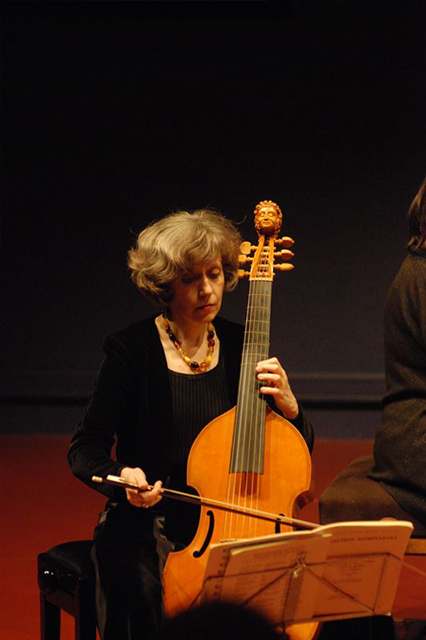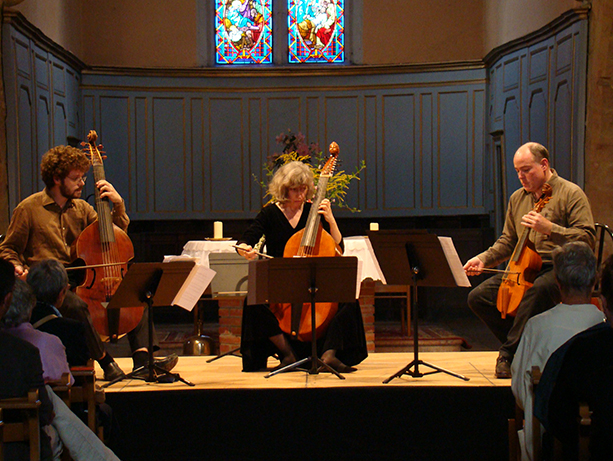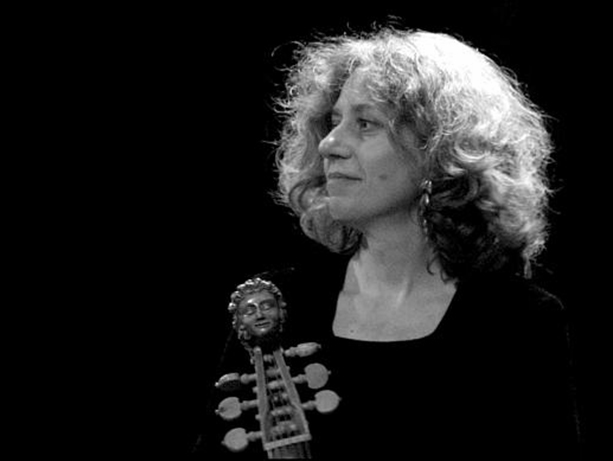


At the bottom left, Marianne Muller with Pau Marcos and Liam Fennelly
La Croix 2019
October 2019
It would be difficult to overstate how delicately Marianne Muller, a grande dame in the viol world, knows how to ornament the melodic line with a fluidity of expression far beyond what many a singer can only dream of.
Emmanuelle Guiliani
Diapason
March 2017
“One would be hard pressed to find anything more luminous, more moving than the voice of Marianne Muller. Her delicate sensuality and the way she carefully delineates the counterpoint with the second viol made her earlier recording a true gem to listen to. Released by Accord in 1992, it has become hard to find, but has now been followed by a second, equally delightful recording by Zig Zag Territoires, soon to be re-released by Alpha”.
Gaëtan Naulleau, Avril 2017
Diapason
November 2010
“Marianne Muller has taken the very idea of a dialogue and crafted it into an unusual recording, poetical and free, alternating between Tobias Hume’s adventurous seventeenth-century music and a number of contemporary ‘mini-modules’ by Eric Fischer.”
Harold Lopparelli
Le Monde
May 2010
“Marianne Muller, on her own or with two other musicians, plays [Tobias Hume] with just the right blend of wit and dreamy fancy.”
Renaud Machard
Diapason
December 2006
“Marianne Muller has a gift : with just a few notes, she can conjure an entire universe that will hold you in thrall without drawing attention to her virtuoso technique, which would inevitably be a distraction from the fantasy worlds she creates. There is a touch of Kempff in her bowing and something of Couperin in her rendition of Marais.”
Gaétan Naulleau
Diapason
September 2006
“Marianne Muller manages to rouse enthusiasm with music that, in many other hands, is less than fascinating. She reveals great subtlety in her choices of tempo, extraordinary control in her phrasing, a touch of rubato and a skill of rhythmical suspension that will send shivers down your spine.”
Harold Lopparelli
Diapason
June 2002
“Marianne Muller reveals Marais as an entirely different character, more secretive, but as moving as ever when the music glides and shivers over Eugène Ferré’s intricate embroidery on the guitar and Pascal Monteilhet’s theorbo, in one prelude in particular or in the long, deep breaths of the radiantly beautiful Sarabande in G in Book III of Marais’ ‘Pièces de viole’.”
Gaetan Naulleau
Dernières nouvelles d’Alsace
March 1998
“Marianne Muller and Willem Jansen are in perfect concord. Her mastery is impressive: the viol sounds surprisingly modern and her use of the vibrato is minimal use but always wisely placed. The harpsichord is crystal-clear. This is a deeply moving duet, whose austere rhetoric barely conceals the smoldering embers beneath.”
Mathias Helzmann
Le monde de la Musique
November 1993
“Marianne Muller renders even the slightest expressive detail with a sensitivity and depth of feeling that are invariably communicated to her audience, without losing any of the power and body that are necessary for more incisive movements.”
Anne Piéjus
France Ouest
August 1991
“Marianne Muller is well above petty professional squabbles; her sole purpose is to serve the music, which she does superbly. This is why she has undeniably joined the ranks of the greatest. Her playing, need it be said again, is warm and full of life, wonderfully sensitive and precise, with no pointless mannerisms and just the right dose of historically informed ornamentation.”
Le Nouvel Alsacien
April 1986
“Marianne Muller’s warm, rich, moving sound was a joy to hear”.
G. Hilpipre
Pierre Michel
January 1986
“Here Marianne Muller demonstrates her high degree of expertise, both technically, with her remarkable mastery of her instrument, and even more so, in her interpretation. Her very ‘inward’ manner, in pieces that require restraint, can also be much more outgoing in other pieces, such as the ‘Labyrinthe’ in Marais’ Book III, where the performer, in a sense, must recreate a performance that was originally improvised by the composer.”
